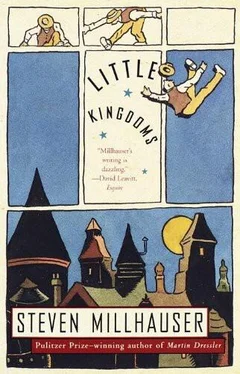But for the most part, Franklin spent his time drawing the editorial cartoons that were Kroll’s particular passion. Kroll wrote a daily editorial, seven days a week, in which he thundered at an abuse, attacked a senator or a budget proposal, turned his attention to the Allied war debts or German reparations, raised questions about the advisability of naval limitations, and for each of his editorials he required a striking one-panel cartoon. At first Franklin experienced the daily assignment as a punishment, but he soon became adept at seizing the central point in a Kroll editorial and teasing it out into the skillfully exaggerated lines of a cartoon. Kroll, a severe and fussy critic, was pleased with his work; and on the first of September Franklin opened his pay envelope to discover that he had been given a handsome raise.
Sometimes, poring over a Kroll editorial, Franklin would feel a sudden impatience. Then taking up his pencil he would begin making tiny sketches all over the margins: funny noses, grinning gnomes sitting under toadstools, little people stuck upside down in mustard jars and sugar bowls, pieces of broccoli with arms and legs, snarling creatures with spiked tails and spotted wings.
One December morning about eleven o’clock there was a familiar knock at Franklin’s door. “Enter,” Franklin called curtly; he had a busy day before him and was irked at being interrupted by Max, who was wearing his hat and an open coat. “I won’t stay long,” Max said, throwing himself into the faded armchair, stretching out his legs, and setting his hat on his knees. “I have to run down to the corner and pick up a couple of ribbons for Helen and be back in time for what’s-his-name, the typewriter repair guy — her ribbon stopped reversing and it’s driving her crazy. There’s a little wheel in there, but I can’t get at it. Incidentally, I quit a few minutes ago. I showed Helen how to take the front off and move the lever with her finger, but she says, and I quote: ‘I can’t live like that.’”
“I assume you’re not serious.”
“Dead serious. ‘I can’t live like that’: her very words.”
“But what’ll you do?” said Franklin, who had stood up and begun to pace. “You can’t just quit like that.”
“You sound like my wife,” Max said, “if I had a wife. Congratulate me, dammit all.”
“Congratulations,” Franklin said quickly.
Max explained that from time to time he had made discreet inquiries at rival papers, but nothing had turned up. Then, about two months ago, an idea had come to him, a bold and stunning idea that at first he had dismissed as mere daydreaming but that had refused to leave him alone. Despite his impulsive nature, he insisted he was cautious when it came to business, and he hadn’t thrown in the towel before making certain he knew what he was doing. And now he was ready: ready to quit the newspaper business entirely and go to work for Vivograph. They liked his art, business was brisk, and there was money to be made. His plan was to start at the bottom, as an inker, though at the same salary as his present one, and work his way up. Then one day, when the time was ripe, he’d strike out on his own.
“What does that mean — strike out on your own?”
Max shrugged. “Start my own studio. Run the whole show.” He put on his hat and stood up. “I’ve got to pick up a couple of ribbons for Helen. Listen, I’ll be around till the end of the week. Lunch tomorrow?”
On the weekend Franklin and Cora celebrated Max’s new job with a roast leg of lamb, ginger ale, and a bottle of bootleg gin supplied by Max; and as Max spoke of the studio system of animation, with its division of labor among inkers, in-betweeners, and animators, as he spoke of production and promotion and distribution, of press releases, full-page ads, and the European market, Cora listened closely and asked precise questions.
“Do you mean to tell me,” she said, “that one of these cartoon films can be made every two weeks?”
“That’s right,” Max said. “There’s a man at Vivograph—”
“So if you had a good distributor,” Cora said, “you could make quite a lot of money.”
“Exactly. Always assuming, of course, that your product satisfies a demand. And that means understanding your audience.”
“I see,” Cora said. “And how do you learn to understand this audience of yours?”
Max looked at the ash of his cheroot and raised his eyes. “You give ten years of your life to Alfred Kroll. That refines you. That sharpens the old sense of smell.”
Max’s absence from the second floor of the World Citizen at first confused Franklin: it seemed a kind of trick. In the long hours at his desk, with the drawing board slanted down against his lap, he kept listening for the sound of sudden footsteps outside his door, the impatient rap, the door swinging open with a clatter of blinds. His relations with his colleagues remained amicable and playful but somewhat distant; once he had lunch with Max’s office mate, Mort Riegel, who suffered from asthma and, when he breathed, made soggy sounds that reminded Franklin of shoes pressing into waterlogged sod, and who spent the entire lunch hour complaining bitterly of having to share an office after eight years of service. For the most part Franklin stayed alone in his office, sketching in pencil on white bristol board, carefully going over the finished drawings in India ink, and erasing unwanted pencil lines — and as he fell into the soothing rhythms of his work he imagined, not without pleasure, the days of his life moving steadily toward him, passing through him, and coming out the other side.
Sometimes once a week, sometimes once every two weeks, Franklin had lunch with Max, who was frantically busy. As Franklin had foreseen, Max was soon complaining about his new job. It was boring, it was burdensome, it provided him with paychecks mysteriously lower than he had been led to expect; but to Franklin’s surprise, the disgruntlement only fed Max’s ambition. Max wouldn’t hear of returning to newspaper work, despite an attractive opening at a rival paper; he was determined, as he repeatedly put it, to strike out on his own. Besides, the work wasn’t all bad; he was learning something new about the business every day. The Vivograph system of studio production saved time but was also stupidly makeshift and haphazard: to save time they did a little of one thing and a little of another, and failed to see that the consistent application of a single method would be far more efficient. Franklin began to argue that efficiency wasn’t everything, that the Ford system as applied to the commercial cartoon had certain drawbacks, since each car was supposed to be identical to the others whereas each cartoon — but he let the argument slide, Max looked irked, it had been a long week for both of them, and besides, Franklin had other things on his mind.
In late March Stella had come down with a low fever that kept her in bed and refused to go away. She had no sore throat, no cough, no cold symptoms of any kind, and only a very slight decrease in appetite, for which her inactivity could be held accountable. What puzzled Dr. Shawcross and disturbed Franklin was her weariness and languor. So long as she continued eating well, the doctor had assured him, there was no cause for alarm; Franklin wasn’t so certain. Stella was a quiet and moody sort of girl, but she had her own sense of fun, which anyone could recognize; and it was the absence of this sense of quiet delight, of secret inner glee, that worried Franklin. Cora was impatient with what she called Stella’s moodiness and was herself too restless to spend much time at a bedside, especially of someone who refused to speak a word or even look at her. But Stella liked Franklin to sit with her while she lay drowsily in her bed with her dark eyes half-closed. He would read to her and tell her long stories that never really stopped, but only reached suspenseful resting points, and one evening he took up her box of colored pencils and began drawing pictures on a small pink pad. “Now look at this, Stelly Bumbalelly,” he said, holding out the pad close to her and flipping it with his thumb: a kangaroo hopped headfirst into a barrel, kicked its legs wildly, and hopped out again. “Again,” Stella said, watching earnestly, crawling up onto her elbow. “You see,” Franklin explained after the sixth time, “it’s really very simple. You draw the pictures in sequence: see? One after the other. Then when you flip them, your eye puts them all together. I can’t believe I’ve never showed you this stuff. Do you have any more of these little pads?” On a plain white pad he drew swiftly, bent over his knee. Then leaning toward Stella, he watched her watching: a turtle dived off a rock and went down, down, passing startled fish until he came to a small house with a smoking chimney; and swimming through the door, he floated onto a bed and went to sleep. Stella was enchanted. Franklin made four more flipbooks for her before she fell asleep, and that night, after Cora had gone to bed, Franklin rose from the armchair in the parlor and climbed the two long flights of stairs to his tower study. Nothing had changed: the bottle of India ink sat on his desk beside two Gillott 290 pens, the little reapers on the faded wallpaper still slept among their faded haystacks. Franklin was calm, but his mind was streaming with images, and when he rose from his desk at four in the morning he had filled an entire sketchpad and had in his brain, in vivid detail, the structure of a new animated cartoon.
Читать дальше












